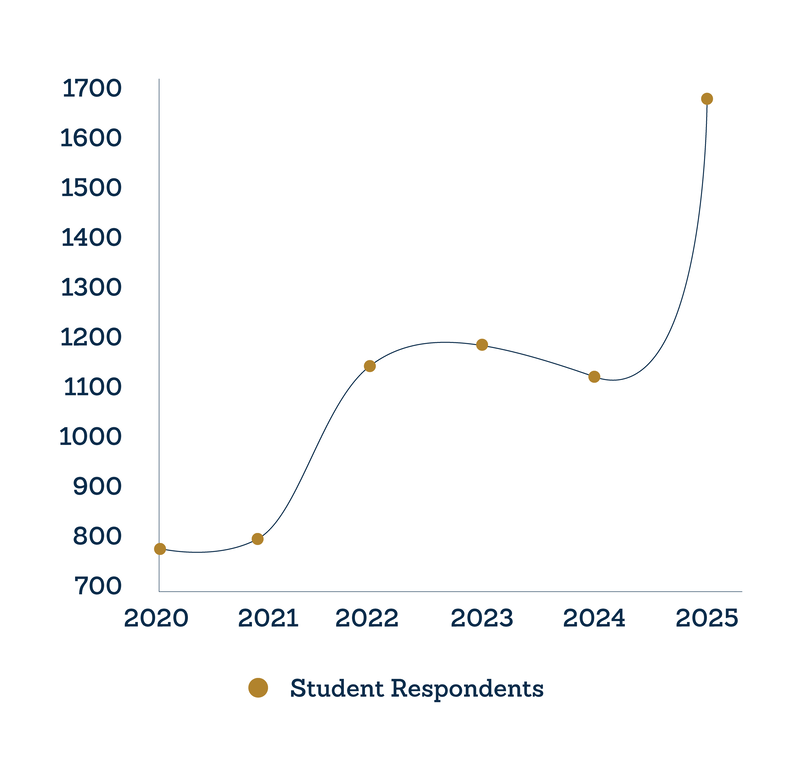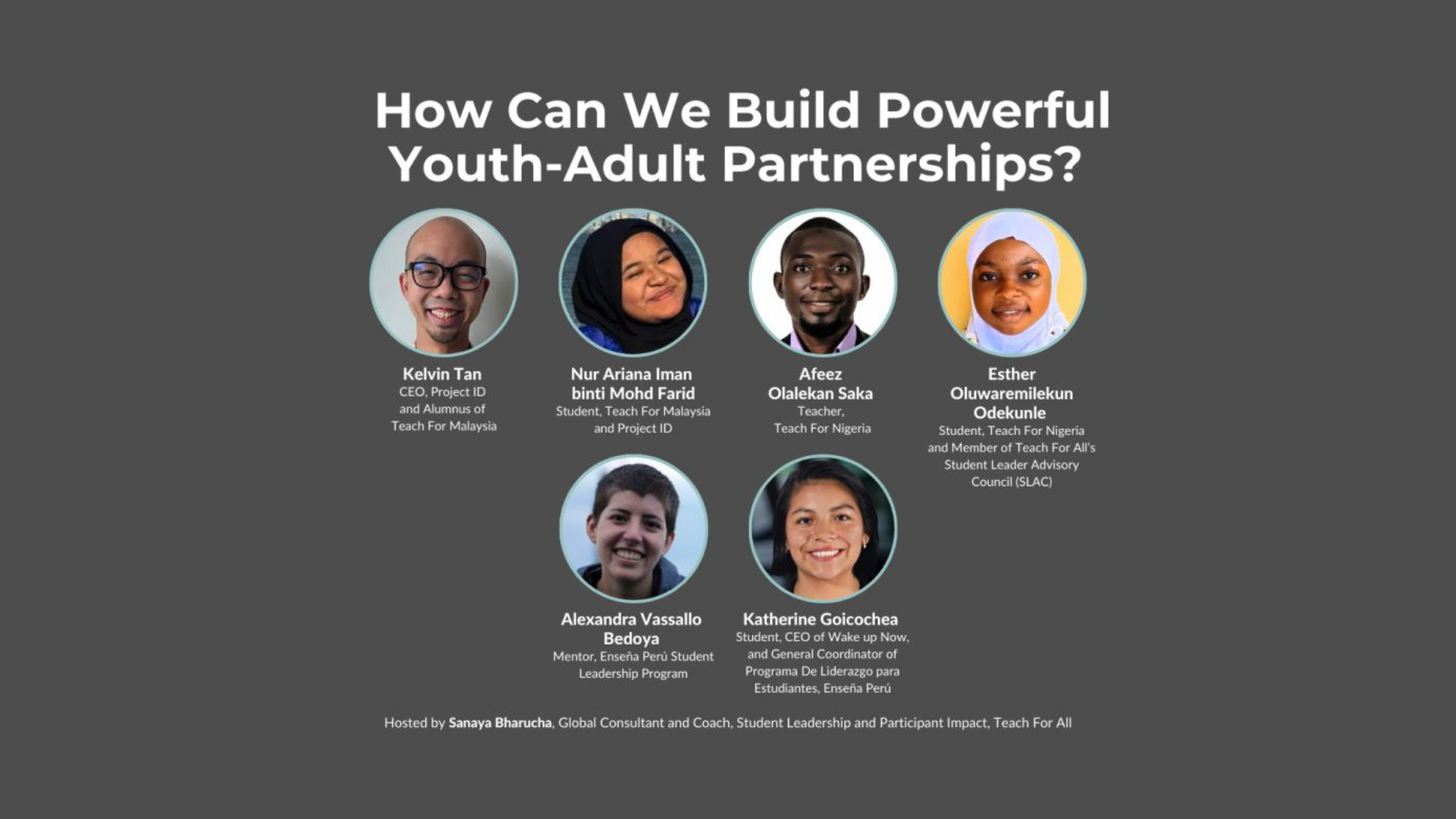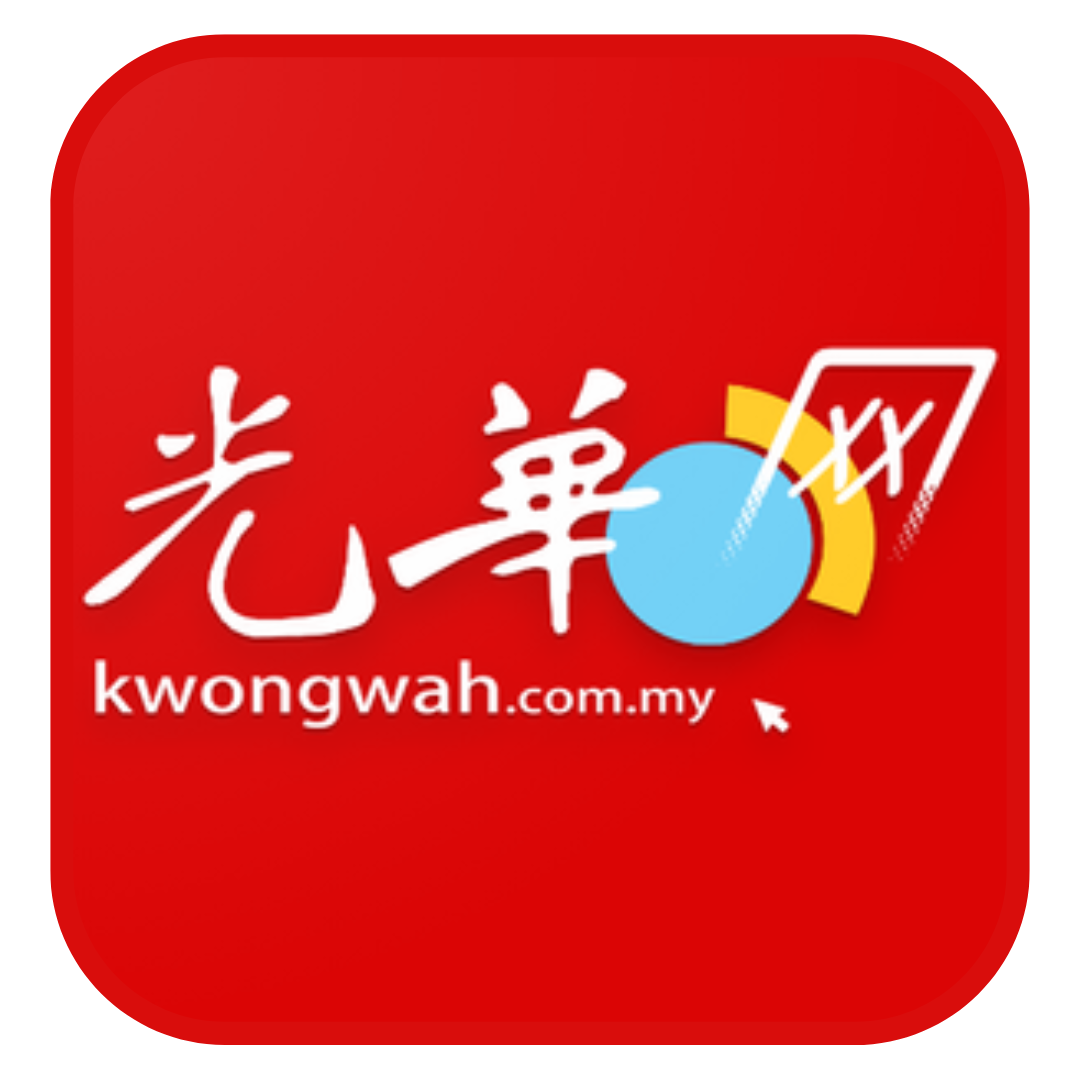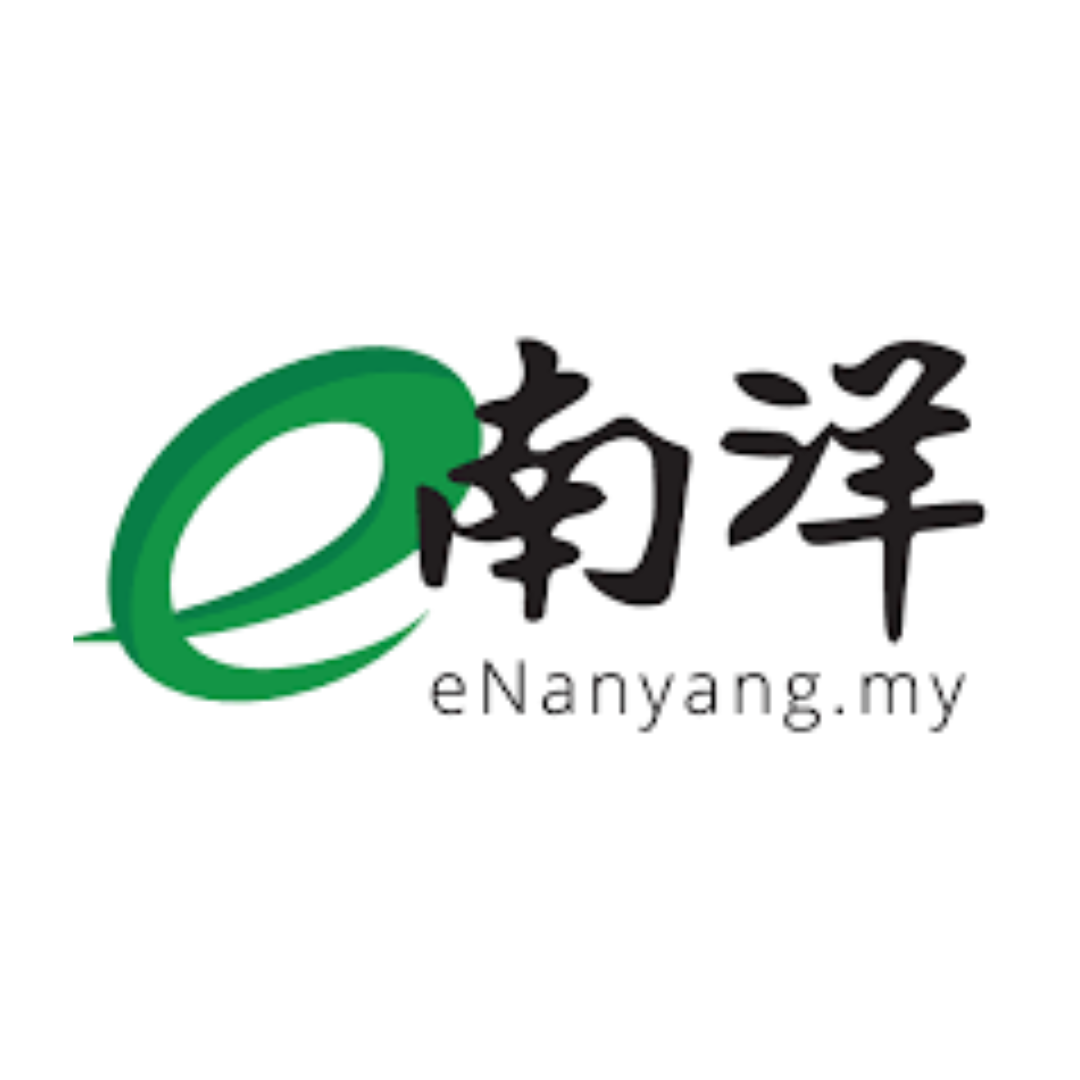Future of Work
Adapting Together:
Youth and the Future of Work in Malaysia

Collective student voice is crucial in co-creating opportunities for the leaders of tomorrow.
Project ID’s proudly presents the 6th edition of Student Voice Matters (SVM). This year, the survey captured insights from over 1,600 students nationwide, representing the survey’s biggest cohort of student voices yet! Excitingly, with this year’s theme being Future Of Work, this edition of SVM will also include perspectives from industry professionals.
As the future leaders of the workplace, students’ perspective are crucial. Yet, amidst rapidly changing workplace trends and challenges in an extremely volatile world, student voice is often overlooked. SVM seeks to disrupt this by empowering students to shape their future, ensuring they are both heard in decision-making and informed about emerging trends.
In Student Voice Matters 2025, the three central focuses are mainly:
Student readiness for the workforce: What is the state of student readiness for future careers?
Industry perceptions of students: How does the industry perceive student readiness?
Supporting our nation’s young talent: How can we work to address gaps and elevate student futures?
What are some key insights from Student Voice Matter 2025?
81.8% of students cited social media as their source of information to learn about job opportunities
Majority of industry respondents say most students come with relevant qualifications, but not a strong understanding of the current industry norms and expectations
Students and industry respondents agree on common factors that can affect students’ career preparedness signals for opportunity for change
What are students saying?
‘‘Having opportunities to talk to professionals from a specific field, visit workplaces, or even just hear about their journeys would really help me prepare myself more realistically for the future.’’
- Student, 16, public school
‘‘One key area of support I currently lack is access to hands-on industry experience, such as internships, mentorships or job-shadowing opportunities..real-world exposure would help me understand workplace dynamics and develop practical skills.’’
- Student, 17, public school
What are industry professionals looking at?
‘‘The need to be curious about socioeconomic conditions and changes and to have the willingness to be proactive in acquiring new information, as well as developing new skills in order to self improve and be adaptable to change.’’
- Manager, education/training
The youth needs to learn to live in uncertainty. Take part to some activity that is not ‘‘comforting’’ to them… Parents need to ensure their children know that courtesy and attitude is a must. Even higher education certificates cant teach these.
- Engineer, energy/utilities
In addition to interning, mentorship with the founder or boss is the fastest way for individuals to learn the ins and outs of the industry. However, not all founders or bosses are willing to provide this hands-on guidance due to the nature of their work and availability.
- Founder, arts/entertainment, startup
Our Call to Action for the Future of Work
As students gear up to be more future-ready, we must ask ourselves how we can provide more opportunities for students…
#1. Deliver university pre-work readiness programmes
Universities must proactively equip students with essential workplace skills before graduation. Implementations such as targeted programmes that cover practical areas such as professional communication, internships, industry awareness, and job search strategies, moving universities to more skill-based learning ideologies that are holistic.
#2. Increase opportunities for volunteering and internships
Expand student access to hands-on learning outside the classroom by building strong partnerships with business and community organisations that can provide students vital real-world experience.
Consider this: In 2023, Project ID through EduKerjaya partnered with JPN Selangor to host 80 Form 4 students, where they upskilled themselves in career readiness workshops, joined internships and visited diverse workplaces.
#3. Expand platforms for young people to explore career pathways
Grow accessible online and physical spaces where youth can discover emerging careers, explore skills, and access learning resources related to career-readiness. These platforms would be able to empower them to proactively develop interest towards different career pathways
Consider this: Schola is an initiative dedicated to providing students with free career planning resources.
#4. Offer incentives for company internships
Motivate businesses to play a key role in preparing the future workplace. Businesses can be provided tangible incentives (such as tax deductions) for hosting student interns and embedding a ‘‘future of work’’ education as part of their onboarding, covering trends and essential skills.
#5. Invest in community skills hub and short course centres
Dedicate to establishing accessible community skills hub and short course centres for underserved rural youths. These hubs can be community-led and it will empower them to gain access to peers, mentors, and career-readiness resources.

When students are given access to real experiences, skills platforms, and opportunities, they grow future-ready. But this impact must also be supported by system-level changes.
#6. Train educators on future work trends and skills
Prepare teachers, school counsellors, and school leaders in schools to have practical knowledge on future-ready skills and contexts (emerging workplace trends, digital skills, etc.) allowing for everyday lessons in the classroom to be relevant as ever across all subjects.
#7. Evaluate school ranking beyond academic indicators
Transform how school success can be measured, moving beyond only exam results. Instead, integrate assessment of important measures such as Social-Emotional Learning (SEL), and demonstrable future-ready skills into official school ranking and evaluation systems.
#8. Explore career schooling modules and recognise vocational pathways
Experiment on how Malaysia’s education system can develop career-focused learning pathways. Simultaneously, advocates of alternative education should continue championing greater recognition for vocation and technical training as valuable and successful career routes.

Explore our previous survey insights!
2024:
Pushing boundaries and possibilities for learning, well-being and life after school
Student’s learning experience and overall mental wellbeing is crucial in ensuring their success in school, allowing them to consider what is life like after their secondary education.
2023:
Student voice in education is changing how we accelerate and invest in their learning
Student agency and voice have become more important than ever in the education space. By listening to and incorporating student inputs in their education, we can reshape teaching to match how students want to learn.
2022:
Students’ Perspectives after Two Years of Online Learning & School Closures
Following two years of remote classes, students shed light on their preferences, and challenges in their learning post-pandemic.
2021:
Changes in Students’ Online Learning Experience After A Year
Recurring school closures have prevented students from returning to normalcy, and virtual classes continue to be the core mode of learning for many students.
Read, Watch, Share!
Explore Student Voice Matters and Project ID in the news.
Malaysian students have mixed feelings, but ‘generally comfortable’ to begin physical classes again
Feature from Malay Mail
Lebih separuh daripada pelajar negara ini pilih pembelajaran hibrid
Media Feature from Astro Awani
Student Voice Matters (SVM) - by Project ID
Feature from HundrED
School closure takes toll on pupils, survey reveals
Feature from The Malaysian Insight
Malaysian students have mixed feelings, but ‘generally comfortable’ to begin physical classes again
Feature from Yahoo!
Survey finds most students enjoy hybrid learning
Feature from The Malaysian Insight
6.8分舒适度 学生满意返校上课
Media Feature from leading Chinese newspaper in Malaysia, Nanyang
M’sian students excited to return to school despite mixed feelings
Feature from Focus Malaysia
2023
How Can We Build Powerful Youth-Adult Partnerships?
The Teach For All network share their experience in building impactful partnerships with students, to empower and create change in schools and the wider community.
Featuring Kelvin Tan (CEO of Project ID and Alumnus of Teach For Malaysia) and Nur Ariana Iman binti Mohd Farid (Student, Teach For Malaysia and Project ID) among others.
Watch the full discussion to learn more from the panelists.
2021
Beyond four walls: Building a more conducive learning environment post-COVID
Teach For All convened a diverse panel of practitioners moderated by the Financial Times Global Education Editor Andrew Jack from across the network and beyond at the 2021 UKFIET Conference, including Project ID CEO Kelvin Tan.
Watch the full discussion for more insights and perspectives from the panelists.
BFM 89.9 Podcast - Empowering Students with Leadership Skills
In an effort to bridge those gaps, co-founder and CEO Kelvin Tan shares how Project ID is working tirelessly to empower students with leadership skills, and how those skills will carry the next generation into a brighter future.
Seek to Speak Podcast - Online Learning and Student Empowerment with Kelvin of Project ID
Kelvin Tan, co-founder and CEO of Project ID explains how he grew a school-based initiative into the impactful social enterprise it is now!
Student Voice Featured!
Special thanks to the many news and publications that featured us.

Connect with us!
We are Project ID!
We are an education organisation that focuses on creating innovative learning experiences for students. Over the past year, we have run over 300 free virtual workshops endorsed by the Ministry of Education to provide high-quality self-development resources in career planning, emotional well-being & more!
Join our growing and passionate student community!
Get The Latest Updates @ PID’s Official Instagram
Get First-Hand News & Announcements @ PID Online Whatsapp Group
For questions and collaboration opportunities, you can email us at
hello@project-id.org.



































